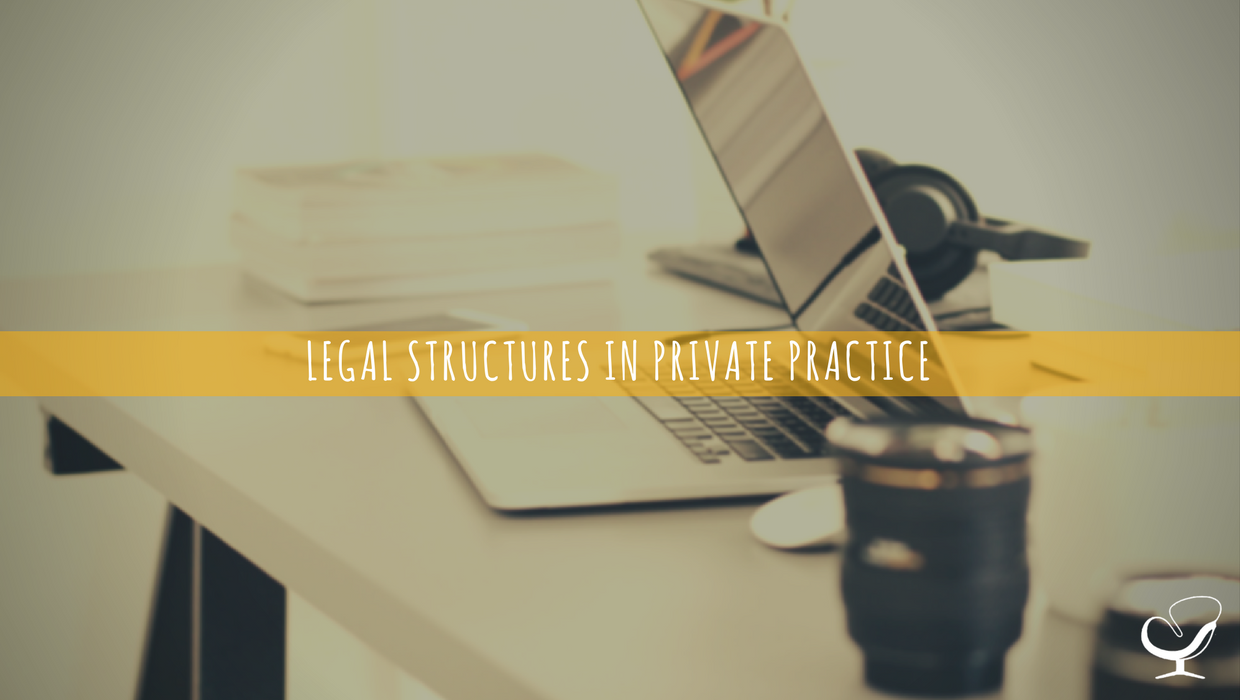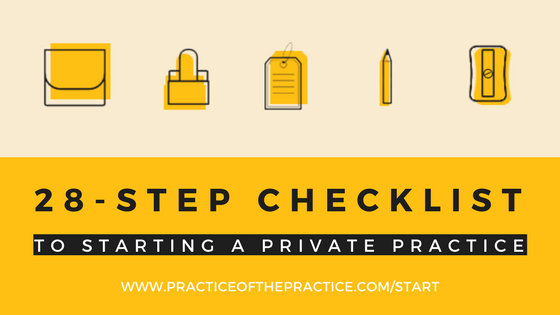Podcast: Play in new window | Download | Embed
In this episode, Joe Sanok speaks about legal structures in private practice.
Podcast Sponsor
Confused by all the advice on starting a private practice? I’d love to help. I put together a checklist of the top 28 things to do to launch a private practice.
In This Podcast
Summary
If you are in private practice and are under the $60 000 mark, this podcast series is for you! Joe is going back to the basics and running through the various phases involved in setting up a practice that is going to thrive! In this episode, Joe speaks about the legal structure within private practice.
Different Types of Legal Structures
Every state has different laws around these, so chat to a state-specific attorney.
1. LLC
- Limited Liability Company
- Not personally liable
- www.practiceofthepractice.com/llc
2. PLLC
- Professional Limited Liability Company
3. S-Corps
- You’re an employee of the company
- Filing taxes
- Only makes sense if you’re in the $80k-$100k range
- ronharriscpa.com/joe
Banking
Automate your books by using a software program like QuickBooks. Visit www.practiceofthepractice.com/quickbooks.
Useful Links:
- Click here to get your legal paperwork going today!
- 28-Step Checklist For Starting a Private Practice
- PoP 158 | S-Corps, LLCs, and Tax Structure for Private Practice with CPA Ron Harris
- How To Name a Private Practice | Step-By-Step
- How To Name a Practice | PoP 259
Meet Joe Sanok
Joe Sanok helps counselors to create thriving practices that are the envy of other counselors. He has helped counselors to grow their businesses by 50-500% and is proud of all the private practice owners that are growing their income, influence, and impact on the world. Click here to explore consulting with Joe.
Thanks For Listening!
Feel free to leave a comment below or share this podcast on social media by clicking on one of the social media links below! Alternatively, leave a review on iTunes and subscribe!
Podcast Transcription
File: POP 260 – Legal Structures in Private Practice
Duration: 0:07:58
[MUSIC]
This is the Practice of the Practice Podcast with Joe Sanok, session #260.
[MUSIC]
[INTRODUCTION AND A START]
Joe Sanok: How is it going? Joe Sanok here. Welcome here live in the radio center two building in Downtown Traverse City. We are all about innovative ways to start, grow, and scale private practices. We are just thrilled that you are taking time off your day to hangout and we are doing a whole series all about starting a private practice and walking you through step by step exactly how you set it up, attract ideal clients and do systems that grow. Right now, we are still in part I, the setup phase. And today we are going to be talking all about legal structures for your private practice. And I do want to say on the front, I am not in account, I am not an attorney. I am talking from my own perspective. I am letting you know my own experience. Make sure you talk to your own attorney and accountant in your own State that understand private practice, understand your goals and can advise you on State specific things.
[DIFFERENT TYPES OF LEGAL STRUCTURES]
It’s good to have a general idea of kind of the basics of legal structure. I am going to walk you through three different legal structures and kind of some of the basics of it. I want to talk a little bit about accounting as well in regards to kind of getting those basics set up. So it’s usually kind of three things. There is LLCs, PLLCs and S Corps, and each State kind of uses a little bit different. But in LLC, it is a limited liability company. It’s a structure for your business that kind of makes it so that you are not personally liable and your personal assets can’t be part of a business law suit. Now, PLLC is just a professional limited liability company, and in Michigan if you are licensed you have to have a PLLC – you can’t have just an LLC. Instead you have to have a PLLC and that’s true in many States. If you are licensed in that State, you have to have a PLLC. That’s why it’s important to talk to a State specific attorney. Now, there is a certain point when it makes sense to start filing your taxes as what’s called an S Corp, and that’s probably beyond where you are at right now, but an S Corp basically makes it that you create that you are an employee of the company and then you file your taxes. Some of them are monthly, some of them are quarterly, and there is all this kind of different bookkeeping things and the amount that you have to pay a bookkeeper to do all the S Corp for the tax savings. Usually doesn’t make sense until you are in that $80,000 to $100,000 range. And Ron Harris did a whole episode about kind of the differences. You can go over to [Inaudible 00:02:57.00]. If you want to talk to my own accountant, he will talk to you. He will let you know about your situation, give you State specific advice about when it is time to switch things over. So what I have found is that actually filing my LLC was fastest through Swyft File and if you head on over to www.practiceofthepractice.com/llc, my friend [Inaudible 00:03:28.24] helped out by going through that process and sharing that was actually way easier for him than LegalZoom. And so that’s what I have been recommending as well as part of kind of the legal setup side.
[BANKING, BOOKS, AND USEFUL LINKS]
Then you also want to make sure that after you have the legal setup, all like your paperwork back. Yeah, you are an official LLC, woo, announced in Facebook, is you want to set up then the banking side. And I got a secret to tell you. For years, I literally would take the receipts from my business banking account and put them in a drawer. And at the end of the year, after labeling the receipts, would sort through them with my wife and spend hours doing this. It was so stupid. It took forever. I just wasn’t on top of my finances…
(yawn) holy gosh, excuse me. It’s afternoon and I am yawning, may curling tonight. You know, I joined a curling team recently and so I do on Tuesday nights. I go curl and I sweep the ice and I throw the stones towards the house and it’s a fun little thing that I do. Altogether, I gear up my energy though. Woo… where was I…
But now I have online QuickBooks. It’s like 9 bucks a month and it integrates with my bank account, keeps track of everything, the receipts. I keep them all in one spot. You can get free or cheap version or discount. I don’t remember what it all is, but if you go to www.practiceofthepractice.com/quickbooks. And if you want any of these resources, they are all part of that course that I have been talking about that you can sign up for over at www.practiceofthepractice.com/start where it’s all about helping you grow from being a confused and overwhelmed to being organized, have a faster launch next year. You get a 20-step checklist, a 5 minute video that walks you through everything, and then also paste out emails. We are going to walk you through totally free. It’s all free.
So when you are looking at legal structure, one mistake a lot of people will make is they will do what’s called a DBA. The amount of people that I talk to that have a DBA and think they have been LLC is profound. So DBA means doing business as, basically means that a person, Joe Sanok, is doing business as a company. It’s just like me doing it personally. And so Doing Business As Mental Wellness Counseling. So if somebody sues me, they will be suing me personally as well as professionally. That LLC or that PLLC is setting up a barrier between myself, my personal self Joe Sanok, and my company Mental Wellness Counseling, me acting on behalf of that company and the more that you muddy those waters between the two, the easier is for somebody to sue you. And so if you are borrowing money from your company or if your company is borrowing money back and forth from you and you are not keeping track of that or if you are using personal space that you are writing off in your business, not only is that against tax code, but also sets you up for a number of problems. So in general, you know the rules. You probably don’t want to write off space in your house unless you have a dedicated space for your practice. And so doing a DBA doesn’t set up the legal protection that most attorneys look for when you are creating a business. So make sure you consult your own attorney and your own accountant, but almost all is you want to have minimum an LLC and then probably an S Corp as well. So after you get your name, after you do your specialty, if you kind of brainstormed your community, then the next step is to have that legal entity set up.
[CONCLUSION]
So next we are going to be diving into even more about starting a practice in the setup phase, then moving it to how do you attract the right clients. This is Joe Sanok signing off. Thanks for letting me into your ears and into your brain. Have an awesome day. Talk to you soon!
[MUSIC]
Special thanks to the band Silence is Sexy for your intermusic, and this podcast is designed to provide accurate and authoritative information in regard to the subject matter covered, given with the understanding that neither the host or publisher or the guest are rendering any legal, accounting, clinical or other information. If you need a professional, you should find one.
[MUSIC]
[END OF PODCAST 00:07:58.17]



